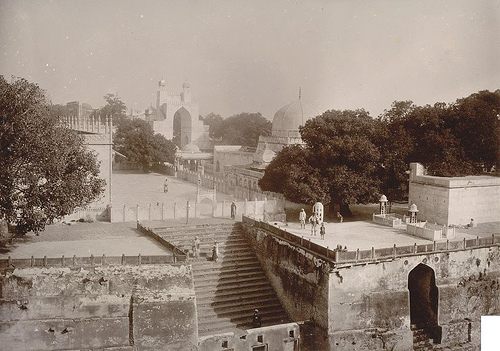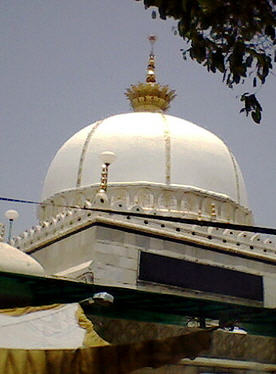Category Archives: Rajab
The Prayer of the Aspirant
Hazrat Khwaja Moinuddeen Hassan Chishti Ajmeri (Rehmatullahi Alayhe)
Blessings of Ramadan Al-Mubarak
By the blessings of Allah, the month of Ramadan is upon us. Rajab marks the beginning of the spiritual season of every believer ending with the end of the fasting month of Ramadan with the Eid Al Fitr. These three months in order Rajab, Shaban, and Ramadan are unmatched in their importance. Â
The Holy Prophet Muhammad (peace be upon him and his family) has said: “Rajab is a great month of Allah Almighty, unmatched by any other month in respect and significance; war with the infidels during this month is prohibited. Verily, Rajab is Allah’s month, Sha’ban my month and Ramadan the month of my Ummah; whosoever fasts a day in the month of Rajab will be granted the great reward of Ridwan (an angel in heaven);  the wrath of Allah Almighty shall be distanced and a door of Hell shall be closed.”Â
Fasting is one of the most recommended acts during this spiritual season. It becomes Wajib (obligatory) during the month of Ramadan, but is highly recommended during the months of Rajab and Sha’ban. As will be noted from the Hadith above, fasting, be it for only one day during these months, is rewarded with untold bounties.Â
The Holy Prophet Muhammad (peace be upon him and his family) used to supplicate upon the sighting of the moon of Rajab: “O Allah, make the months of Rajab and Sha’ban blessed for us, and let us reach the month of Ramadan (i.e. prolong our life up to Ramadan, so that we may benefit from its merits and blessings).”
[At-Tabarani and Ahmad]
Our beloved Prophet Muhammad (peace be upon him and his family) said:
“When a believer (Mu`min) sleeps in the night of Ramadan, an angel says unto him, “Awaken!! as Allah Almighty wants to shower His blessings on you. Thus, the believer awakens. It is at this time that the (1) linen of the bed sheet that he was sleeping on prays for him and then when this person puts on his garbs to perform the prayer, (2) the clothes supplicate for him, ‘O Allah! Clothe this person from the garbs of Paradise.’ And when he puts his shoes on, (3) the shoes pray for him, ‘O Allah! Make this person’s feet steadfast on the Pul Siraat.’ and when he (or she) uses the vessel for wudu, (4) the vessel prays for him, ’O Allah! let him/her be one from the people who drink from the vessels of Paradise.’ When the person starts to make wudu, (5) the water prays for him, ’O Allah! Expiate his major and minor sins.’ Finally when he (or she) stands on the prayer mat facing in the direction of the Ka’ba, at that time the House of Allah prays for him, ’O Allah! Expand and illuminate this person’s grave.’ Ultimately, when Allah Almighty looks down, He says, ‘O My servant, there are supplications made for you, there is acceptance from Me.’â€Â
This goes to show that Allah Almighty  always answers the prayers of those who plead from Him in Ramadan.Â
The Prophet Muhammad (peace be upon him and his family) has also said that a fasting person is in a state of worship, even when he (or she) is asleep, the breath he (or she) takes is Tasbih (glorification of Allah), his supplications are honored, sins are forgiven and good deeds multiplied. Subhan Allah! Alhumdulillah!Â
My dear brothers and sisters, shouldn’t we be thankful to Allah Almighty for his Mercy and Graciousness upon us? When Allah Almighty considers a regular, fasting individual’s inhalation and exhalation a tasbih, can you imagine the value of the breath of the “Zakireen” in the eyes of Allah?? “Zakireen” are people who are always involved in the remembrance of Allah. They are the ones:Â
“Who remember Allah while standing, sitting and lying on their sides …”
[The Holy Quran, Chapter Aale-Imran, 3:191]Â
Allah Almighty also says:Â Â
“And We will surely test you with something of fear and hunger and a loss of wealth and lives and fruits, but give good tidings to the patient.â€
[The Holy Quran, Chapter Al-Baqarah, 2:155]
“…Only those who are patient shall receive their reward in full, without reckoning.â€
[The Holy Quran, Chapter Az-Zumar, 39:10]Â
It has been narrated by Hazrat Abu Salman (may Allah have mercy on him) that “Hunger is from one of the treasures of Allah, and He bestows it upon the ones that He loves.” Â
May Allah Almighty make our fasting in Ramadan easy for us and accept our fast. We ask You Allah Almighty, to accept our worship by the Wasilah (Rank) our Beloved Prophet Muhammad (peace be upon him and his family) who never himself slept on a full stomach throughout his life. Aameen.Â
Dear brothers and sisters in Islam, it is time to GET UP and GET READY for there is now a SALE on good deeds. The rewards for good deeds done in Ramadan are multiplied by a thousand. Who knows what tomorrow brings for us?? Who knows if we will be able to get another Ramadan?? Which fasting person knows if he/she will fast another Ramadan? Which person in “qiyaam” knows if he/she will be getting this opportunity again? It is time to rethink and use our time wisely. Do not let yourself get involved in futile things as death nears us on every breath we take.Â
Allah has made the Deen very easy on us. Read the following Hadith that is related by Hazrat Anas bin Malik (may Allah be pleased with him):Â
A man from the dwellers of the desert came (to the Holy Prophet, peace be upon him and his family) and said: Muhammad, your representative came to us and told us that you claim that Allah had sent you (as a Prophet). The Holy Prophet (peace be upon him and his family) remarked: He told the truth. The bedouin asked: Who created the Heaven? The Holy Prophet replied: Allah. The bedouin asked again: Who created the earth? The Holy Prophet replied: Allah. The bedouin asked again: Who raised these mountains and who created in them whatever is created there? The Holy Prophet replied: Allah. Upon this the bedouin remarked: By Him Who created the Heaven and the earth and raised mountains thereupon; has Allah in fact sent you? The Holy Prophet said: Yes. The bedouin said: Your representative also told us that five Prayers (have been made) obligatory for us. The Holy Prophet remarked: He told you the truth. The bedouin said: By Him Who sent you, is it Allah Who ordered you about this (i.e. Prayers)? The Holy Prophet said: Yes. The bedouin continued: Your representative told us that Zakah had been made obligatory in our riches. The Holy Prophet said: He told the truth. The bedouin questioned: By Him Who sent you (as a Prophet), is it Allah Who ordered you about it (Zakah)? The Holy Prophet replied: Yes. The bedouin said: Your representative told us that it has been made obligatory for us to fast every year during the month of Ramadan. The Holy Prophet said: He told the truth. The bedouin asked again: By Him Who sent you (as a Prophet), is it Allah Who ordered you about it (the Fasting of Ramadan)? The Holy Prophet said: Yes. Once again the bedouin questioned: Your messenger also told us that Hajj has been made obligatory for whoever is able to undertake the journey. The Holy Prophet replied: He told the truth. At the conclusion of this answer the bedouin set off, and at the time of his departure remarked: By Him Who sent you with the Truth, I would neither make any addition to them nor would I diminish anything out of them. Upon this the Holy Prophet remarked: If he were truthful (to what he said) he must enter Paradise.
[Sahih Muslim]Â
So dear brothers and sisters, Allah Almighty has made the Deen very easy on us. He is not looking for a huge quantity of prayers, or vast amounts of fasting from us but for the piety and purity in our worship. May Allah bless us with the blessings of this month and accept whatever little we can do. Peace to you O Ramadan! For you are a savior for us sinners. O Allah Almighty, please forgive us on accord of the people whose worship you have accepted. O Allah! Forgive me and the people I love, whether they are family or friends. O Allah! Allow us to continue loving each other for the sake of Allah, whether it is our parents, our children, our elders, our pious predecessors, or our friends. O Allah! We seek Your Mercy and Your Forgiveness. Aameen.Â
As–salaatu was-Salaamu ‘alaa RasooliLlaah.
Sister Najma Khatoon
Kingdom of Bahrain
Sister Najma Khatoon is a spiritual mentor, teacher and author. She writes articles for Tazkiya Nufoos, a quarterly Urdu journal of the Idara Kashful Asrar of India. The following is an excerpt translation for an article on Ramadan. Translation by Mrs. Noor of Houston, Texas.
















